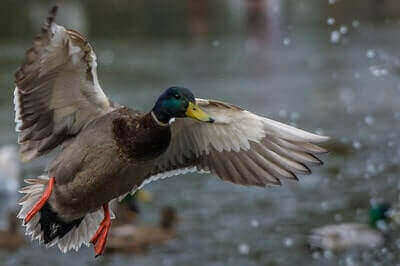Disclosure: We may earn commissions if you purchase products after clicking on a link from our site.
If you’re looking to add some new ducks to your flock, you’ll need to know how to scout for ducks. In this blog post, we’ll discuss the best ways to find ducks and how to identify the ones that are right for you. We’ll also cover tips on how to make the process as easy as possible. Scouting is an integral part of hunting and how successful you will be during the season depends on how much good scouting was done prior to hunting season.

What To Bring To Scout Ducks
1. Binoculars
With a binocular or spotting scope, you can watch ducks from a distance to learn about their habits, movements, etc. Using a binocular or spotting scope in essential when learning how to scout for ducks. You can read a review of the best spotting scopes on the market today.
Binoculars are an essential tool for scouting ducks, allowing hunters to observe waterfowl from a distance without disturbing their natural behavior. With their magnification capabilities, binoculars enable hunters to scan large areas of water and surrounding habitats to locate ducks, identify species, and assess their behavior.
By using binoculars, hunters can spot ducks from afar, even in low-light conditions or adverse weather, enhancing their ability to plan effective hunting strategies. Additionally, binoculars help hunters scout potential hunting locations, such as marshes, lakes, or rivers, by providing a closer look at water conditions, vegetation, and other features that may attract ducks.
With their compact and lightweight design, binoculars are convenient to carry and use in the field, making them an invaluable asset for duck hunters seeking to improve their scouting efforts and increase their chances of a successful hunt.
2. Decoys
To attract ducks, you can use decoys as ducks are curious and just might come down to check out the decoys. Most duck hunters use decoys when scouting and hunting ducks. When learning how to scout for ducks, decoys are very useful to accomplish your goals.
Decoys are indispensable tools for scouting ducks as they help hunters simulate natural flocking behavior and attract ducks to potential hunting locations. By strategically placing decoys in water bodies or fields where ducks are known to frequent, hunters can create the illusion of a safe and desirable feeding or resting area for passing waterfowl.
Decoys come in various shapes, sizes, and species representations to mimic different types of ducks, allowing hunters to tailor their setup to match local bird populations and preferences. When scouting ducks, deploying decoys can provide valuable insights into how ducks react to different setups, including their approach, landing, and interaction with other decoys.
Observing duck behavior around decoys helps hunters identify effective decoy spreads and refine their hunting strategies for future hunts. Additionally, decoys serve as visual markers for scouting, helping hunters locate potential hunting spots from a distance and assess the effectiveness of their decoy placement for attracting ducks.
3. Duck Calls
You can also use calls in addition to the decoys to persuade ducks to fly down and check out the decoys. Duck calls are essential tools for scouting ducks, allowing hunters to mimic the sounds of various duck species and attract birds to their location.
By imitating the vocalizations of ducks such as quacks, feeding calls, and greeting calls, hunters can create a sense of activity and safety that entices passing ducks to investigate further. Duck calls come in a variety of designs and materials, each producing distinct sounds that can be used to communicate with different duck species and mimic different behaviors.
When scouting ducks, using duck calls effectively involves understanding the natural vocalizations of ducks in the area and matching them with appropriate calls to maximize their effectiveness. By incorporating duck calls into their scouting efforts, hunters can gauge duck responsiveness, locate potential hunting areas based on duck reactions, and fine-tune their calling techniques to improve their success when hunting.
Additionally, duck calls can serve as valuable scouting tools by helping hunters identify the presence of ducks in the vicinity and assess their behavior and proximity, providing crucial information for planning future hunts.
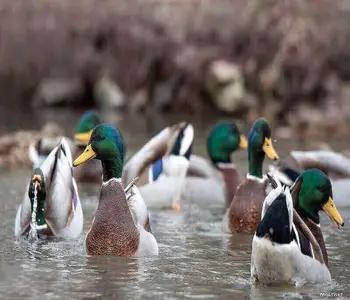
4. Notepad & Pen
You will not remember all the important scouting information you got when scouting different fields. To keep track of the information from different fields like bird patterns, wind directions, sketches, etc. you want to take notes that you can later read when home. Or you can use a hunting app and record the locations in the app and take notes in it. How to scout for ducks can involve many different approaches.
How To Scout For Ducks
1. Roosting Locations
When scouting for ducks, you want to look for spots where they roost. You will have to do some research to locate resting areas. You can quickly research public lands on the internet to find possible areas where ducks may be living. The Department of Natural Resources provides locations of public land on its site.
Although it is good scouting practice to locate roosting areas, it is not the best idea to hunt ducks where they roost. It might cause them to relocate to another area as they realize their roosting area is no longer safe. Work to locate their feeding, resting, and roosting areas.
2. Use Apps
You can use apps like onX, BaseMap, and HuntStand to get information on roost sites. Find a high spot where you can set up a binocular or spotting scope to search for ducks. When learning how to scout for ducks, hunting apps can be a great help.
3. Shorelines
Scout for ducks near the shoreline. Ducks tend to like shorelines and calmer waters. Find a way to get to calm shores, bays, and coves to search for ducks. When you are learning how to scout for ducks, closely monitor the shorelines as you will observe ducks and their behaviors. You can also take note of the times they are often around the shorelines.
4. Inaccessible or Hidden Areas
The problem with scouting shorelines is that every hunter will target the shorelines. This can scare ducks away. You can take a different approach by also searching for hidden areas along the waterway and inaccessible areas or hard-to-access areas. if you can spot these areas if they are available, you might find ducks there. We discussed 30 hunting items every hunter needs in this article that you can read.
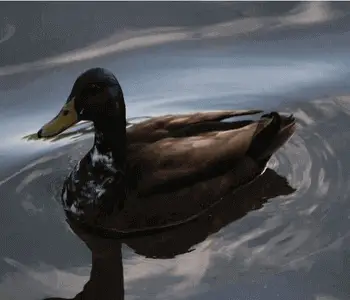
5. Decoys
Use decoys when scouting for ducks. This is a tried and tested way of luring waterfowl when hunting. Most of the time ducks will fly down when they spot decoys. They always want to come to check out other ducks. Ducks are curious birds.
6. Make Calls
In addition to deploying decoys and dekes, you can also call out when the decoys and dekes are in place. The calls will be heard by ducks and they might respond to the calls by flying toward the calls. When they spot the decoys, they may just come down thinking the decoys are the ones making the calls and looking for attention.
7. Binoculars or Spotting Scopes
When scouting for ducks, use a binocular or a spotting scope to glass waterways and other areas for ducks. With a binocular or a spotting scope, you can stay some distance away and glass the area. A review was done of the best hunting binoculars that you can read from this link.
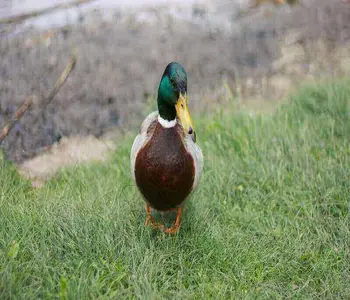
8. Food Sources
To successfully scout ducks, you need to know what they eat and locate those areas. Ducks eat almost anything. They eat small fish, aquatic plants, seeds, insects, amphibians, crustaceans, etc. These can be found in wetlands, marshes, streams, lakes, and ponds. Look in these areas for ducks as they will be looking for food.
9. Breeding Season
It is important to know when is the best time to scout for ducks. This time period is from March to June. During this time ducks will be in search of mates for mating. Look for ducks during this time period in areas with lots of vegetation.
10. Chat With The Locals
Find time to talk to the local people near the areas you want to scout for ducks. If there are farms nearby, meet the farmer and strike up a friendship. Find out as much information about the ducks in the area if there are any. Find out when he will harvest his crops, which crops will be harvested, and when they will be replanted. Chat with other locals and you might be surprised how much valuable information you will gather from them about the ducks in the area.
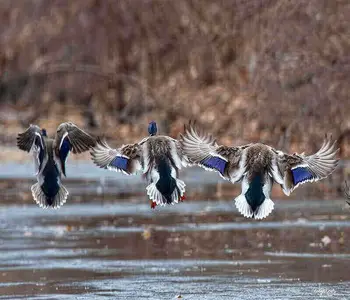
11. Waterfowl Migration Reports
Watch out for waterfowl migration reports from your state wildlife agencies and from apps like Ducks Unlimited. With that information, you can plan and watch out for a flock of waterfowl coming into the area.
12. Scout Early & Late
Scout early in the morning and late in the evening. During this time you will gain a lot of information about ducks like their feed and loafing areas, their flight paths, and the times of the day that they move about. With this information, you can plan well for the hunting season.
The Bottom Line
Scouting is an important aspect of successful hunting. Many hunters attach little importance to proper scouting, but it is more important than actually hunting. With real preparation and good scouting, you will be very successful when the hunting season starts.
In this article, we discussed how to scout for ducks to help you succeed this duck season. You can also read how to scout turkeys, how to scout the hunting ground, and how to scout for deer.
